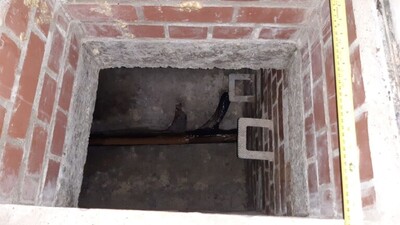An NHS estates team employee at Kettering General Hospital had been inside a manhole to unblock a drain when he was overcome by fumes and fell unconscious. Discovered by other members of the hospital staff, he was rescued by Northamptonshire Fire and Rescue Service but despite hospital treatment for acute sulphate intoxication he tragically suffered a traumatic brain injury, resulting in ongoing issues with memory loss and nerve damage.
An HSE investigation revealed Kettering General Hospital NHS Foundation Trust was deficient in three areas:
Failure to identify a confined space
Noxious gases that commonly accumulate in sewage systems include hydrogen sulphide, ammonia, methane, esters, carbon monoxide, sulphur dioxide and nitrogen oxides. These are hazardous to human health and can cause not only severe injury but even death.
Any areas of a sewage system that workers may need to access for maintenance or repair work are identified as confined spaces under The Confined Spaces Regulations 1997.
The investigation showed that the NHS Foundation Trust had failed to identify the manhole as a confined space.
Failure to provide a risk assessment
To mitigate the dangers of working in confined spaces, employers are required to provide a risk assessment.
The investigation revealed that the NHS Foundation Trust had not prepared a risk assessment for working in this space.
Failure to provide adequate training
Employees should also be familiarised with safe working practices when working in confined spaces, in line with the HSE Approved Code of Practice. This includes important information on the use of suitable personal protective equipment (PPE), the potential hazards and how to deal with them should they occur.
Once again, the investigation exposed that the NHS Foundation Trust had failed to provide suitable training for estate employees working in confined spaces.
Outcomes of failure affect victims and employers
On a personal level, the worker was left with life-changing injuries but there were also legal and financial ramifications for the NHS Trust, who pleaded guilty to breaching Section 2(1) of The Health & Safety at Work etc. Act 1974.
On 9th January 2024, the Trust was fined £480,000 and ordered to pay £4,286.15 in costs by Wellingborough Magistrates Court.
Are your construction workers protected?
Entering confined spaces in drainage systems on construction sites can be equally dangerous, particularly if a new system is connected to an operational sewer system producing noxious gases.
At the same time, construction sites are prone to drain blockages as silt and debris from the work washes into manholes, inspection chambers and road gullies. Clearing these blockages before site handover can be a messy, time-consuming and expensive task, but also dangerous.
This is why Drainfast has developed the MuckStopper range of drainage system protectors, designed to collect silt and debris as it falls into the chamber and prevent it from blocking the pipework. MuckStopper products, developed specifically for removing silt and debris from manholes, inspection chambers and road gullies while the workers remain safely aboveground, eliminate the need for workers to enter confined spaces.
Don’t take the risk of worker injury and court fines. Contact Drainfast today on 01420 555600 or email [email protected] to implement MuckStopper safety on your construction sites.
Source: NHS trust fined after employee found unconscious in manhole (https://press.hse.gov.uk/2024/01/09/nhs-trust-fined-after-employee-found-unconscious-in-manhole/)

Written by
Mark Chambers
Head of Marketing
As Head of Marketing, Mark plays an active role in running strategic projects to increase our brand profile.


